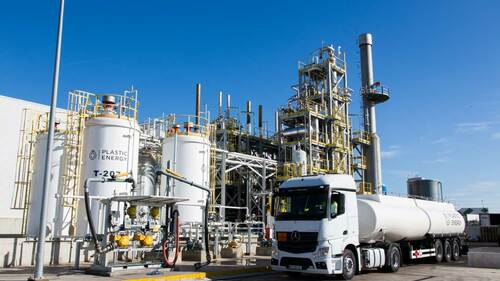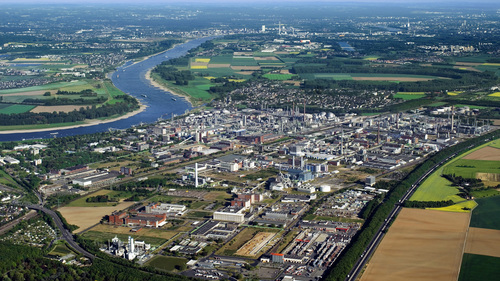INEOS signs agreement with Plastic Energy for its largest plant to produce 100,000 tonnes of raw materials from plastic waste at Köln, Germany
INEOS Olefins & Polymers Europe and Plastic Energy, have today announced a Memorandum Of Understanding to produce 100,000 tonnes per annum of recycled raw materials from plastic waste. This will be the largest use of Plastic Energy technology on the market. These new raw materials will enable a circular approach to produce essential plastic items that meet the requirements of demanding food contact and medical applications.
Production will be based in Köln, Germany. Plastic Energy’s patented TAC™ recycling technology will turn difficult-to-recycle plastic waste otherwise destined for incineration or landfill, into a valuable raw material TACOIL™, a Plastic Energy product that can be used to create virgin-quality polymers.
INEOS will also invest in technology to process the TACOIL™ further before feeding it to their steam crackers, where it will replace traditional raw materials derived from oil. This use of advanced recycling enables plastic waste to be turned into new, virgin-quality materials that can be used in demanding applications where safety standards require the highest level of product purity and performance.
As well as reducing the risk of plastic pollution and the use of fossil-based raw materials, the circular re-use of ‘end of life’ plastic will also help to reduce total emissions, supporting the transition to net zero.
INEOS and Plastic Energy first announced a collaboration to explore the construction of a commercial scale plant in 2020. Working together TACOIL has already been successfully converted into virgin-quality polymer through the INEOS cracker at Köln, Germany, and used by selected customers and brands to demonstrate the viability and demand for materials from advanced recycling. As a result, INEOS and Plastic Energy are now delighted to announce this extension of their partnership. Production is targeted for the end of 2026.
Rob Ingram, CEO, INEOS O&P Europe North, said: “Advanced recycling is an essential part of the solution for turning plastic waste into materials that can be used for demanding applications. Our position is that advanced recycling has to be done at scale in order to make the process environmentally and commercially viable. I’m therefore delighted to take this first step with Plastic Energy towards building that kind of capability from day one.”
“This is further evidence of our commitment to creating a more sustainable future for our industry and in particular developing a circular economy that keeps valuable materials in use and out of the environment.”
Carlos Monreal, Founder and CEO of Plastic Energy, said: “We are pleased to announce this project with INEOS to further scale our portfolio of plants in Europe. TACOIL™ from our recycling process has already been used in products that have been commercialised on the European market, and we look forward to working with INEOS to enable the production of more recycled content.”
Using a mass balance approach, an independent, third-party organization such as ISCC or RSB will certify that fossil-based feedstocks have been substituted by the new, recycled materials and ensure that recycled benefits are being accounted for correctly. A mass balance approach enables co-processing of circular and fossil feedstocks, a key step in the transition to a circular economy.
More on INEOS O&P Europe’s recycling solutions
This is further evidence of INEOS O&P Europe’s commitment to taking action across the value chain to create a more sustainable future. Advanced recycling solutions are complementary to its Recycl-IN range, which compounds mechanically recycled materials with highly engineered polymers to produce products that enable converters and brand owners to meet consumer demands for an increase in the use of recycled materials, while meeting high performance specifications.
Advanced recycling provides solutions for applications such as food contact and medical, while the Recycl-IN range targets non-food contact uses. The complementary nature of the two approaches is also reflected in the type and qualities of waste used for each.
Categories
Investments
2022-01-01
at Chempark Dormagen (DE)Chemical substances
Countries
Companies
Latest news
INEOS launches €250m investment supported by the French Government to secure the future of French industry at Lavera
The project marks the first phase of a long-term regeneration plan to reduce emissions, boost reliability, efficiency and competitiveness, with support of the French State.
Hycamite’s technology to decarbonize shipping awarded AiP by industry leader DNV
Kokkola Industrial Park →Hycamite’s proprietary Thermo-Catalytic Decomposition (TCD) technology offers a new approach to producing clean hydrogen by breaking down methane, the primary component of liquefied natural gas (LN...
Clariant catalysts will power the Ecoplanta: Europe's first waste-to-methanol plant
Chemmed Cluster Tarragona →Repsol is building Europe’s first plant to produce renewable methanol from urban waste The facility will use Enerkem gasification technology to produce 240 KTA of methanol Clariant will supply cata...
Lilly plans to build a new $3 billion facility to boost oral medicine manufacturing capacity in Europe for patients worldwide
Netherlands site will bring 500 manufacturing and 1,500 construction jobs while further strengthening Lilly's global supply chain



